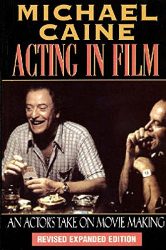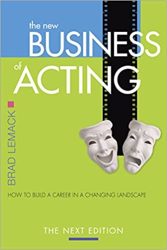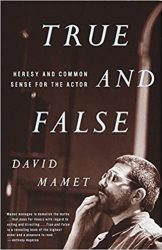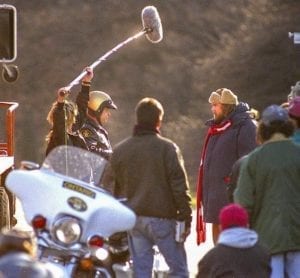If you’re considering becoming an actor, you might be wondering, “How do actors get paid”?
Actors get paid for the filming (e.g. a daily rate) and might also get residuals (money for every time the episode/commercial airs) but residuals are becoming rare (instead you might get an extra 10% of your daily rate). Some also get paid for activities such as doing signings and sitting on panels.
The details about these sources of acting income are discussed below. The money often isn’t enough for many actors to live on so we also include a bit of a discussion on what kinds of additional jobs actors can have to supplement their income.
Introduction
I remember the first time I met the woman that would become my very first agent in film and television. Ironically It was right out of a movie. She had big hair, stilettos, and chain-smoked. We sat down, she lit her cigarette, looked me straight in the eyes and said, “So, you want to be an actor huh? What are you going to do for money?”
That was her test; because if you were going to worry about making money, then you probably weren’t going to make it as an actor. That’s not to say that actors don’t make money. However, there is making money, and then there is making enough money to live on.
If I had to break it down, there are three ways that actors make money.
The Job
You’ll make money doing the acting job. Depending on the contract, this can be a flat daily rate, an hourly rate, or once you become experienced enough, you may have a quote. The standard rate is called scale. As an actor starting out, you could maybe average this out to $1000 in a day. Not too shabby, right?
Here’s the problem though, and it’s best summarized by a quote that my old acting teacher used to say, “It’s great money when you can get it.”
You could get booked for one day on a TV show and make $1,000, but then you’ll likely never work on that TV show again because you’ve been established. Not sure what I mean?
Think about every really popular franchise (Marvel, The Walking Dead, Orphan Black, Game of Thrones). People go crazy looking for easter eggs, analyzing, and doing an excessive amount of additional research. There are YouTube channels dedicated to this. Production companies know this, and it makes them less likely to bring you back at a later date, even if your initial role was really small.
So, let’s say you landed the role of Tough Cop in an episode of a TV show; that same TV show would be unlikely to cast you as an inmate the following season.
Another example of this would be a friend of mine who was cast twice in the same show. During his second appearance, they cut every shot that showed his face because he had already been established in the previous season.
The exception to this is if the production company decides to bring your character back. This is pretty rare in the beginning, as you will more likely be cast in roles like paramedic 1, cashier or mean lady.
The Residual
A residual is a payment you receive every time the episode, movie or commercial that you worked on is aired. If you recorded a commercial and a few years later it was shown somewhere else in the world or even again where you recorded it, you would receive a residual.
If you worked on a movie that has a release in multiple countries, you’d receive a residual for every release. You’d also receive residuals if it later aired on TV.
An acting friend of mine did a Volvo commercial about 10 years ago. At the time of this writing, it has aired a few different times in a few different countries; and every time that happened, he got a check in the mail.
The first few acting gigs I did were one day of work in a movie or on a TV show; I still get $50 to $100 in residual checks once or twice a year from those.
Do you always get residuals? No, They’re actually becoming rare, especially for smaller roles.
What you’ll see a lot of in contracts now is you’ll book a day or two on a TV show, and you’ll get your daily rate plus a 10% buyout. This means they pay you an extra 10% instead of having to give you residuals for the lifetime of the project.
I still make residuals on jobs I worked 10 years ago, but I don’t make residuals from jobs I worked two to three years ago.
The Peripheral
The last way an actor makes money is in peripheral things related to the role.
This is very rare and only really applies if you manage to get a larger role in film or television, or the project you work on gets a following. So by peripheral, we mean being asked and being paid to do things because of the part you played as an actor.
A great example of this is a friend of mine who ended up being in a season of Stargate. She had a guest-starring role but was in most of the season. After the season aired, she started getting requests to go to various comic-cons, sit on panels and do signings. For each one of those, she would always be paid, and it became a very lucrative side hustle. This is what we mean when we say Peripheral.
Beyond these three, it is also important to note that it is very common for career actors to maintain additional jobs while they focus on their acting career. These jobs can be broken down into two categories; jobs that complement acting and jobs that don’t.
Additional Jobs
Jobs That Complement Acting
Many veteran actors will do team-building workshops for the corporate world. They might also get jobs in doctor, police, or legal training, where they are tasked to act out a patient, person, or client in a training scenario to help students. Some seasoned actors may also start teaching. These jobs allow you to still work on your craft while making an extra buck.
Jobs That Don't Complement Acting
We’ve all heard the stereotype of the actor who works in a restaurant. There’s a reason for that, most auditions for professional acting are done Monday through Friday from 10:00 a.m. to maybe 5:00 p.m. This means regular working hours or having a day job will likely make it very challenging, if not impossible, to go to auditions. This is the main reason most actors lean towards restaurant work. It’s an evening job that allows them a lot of flexibility.
For more details, take a look at the article about being an actor part-time.
Can you make money as an actor?
The question is, can you make money as an actor? Yes, but it might not be in the way and amounts you expect. You need to be ok with uncertainty; not knowing where your money will come from in a month. That is just one of the many reasons that an actor’s life is so hard, but then again if it was easy anyone could do it.




























































